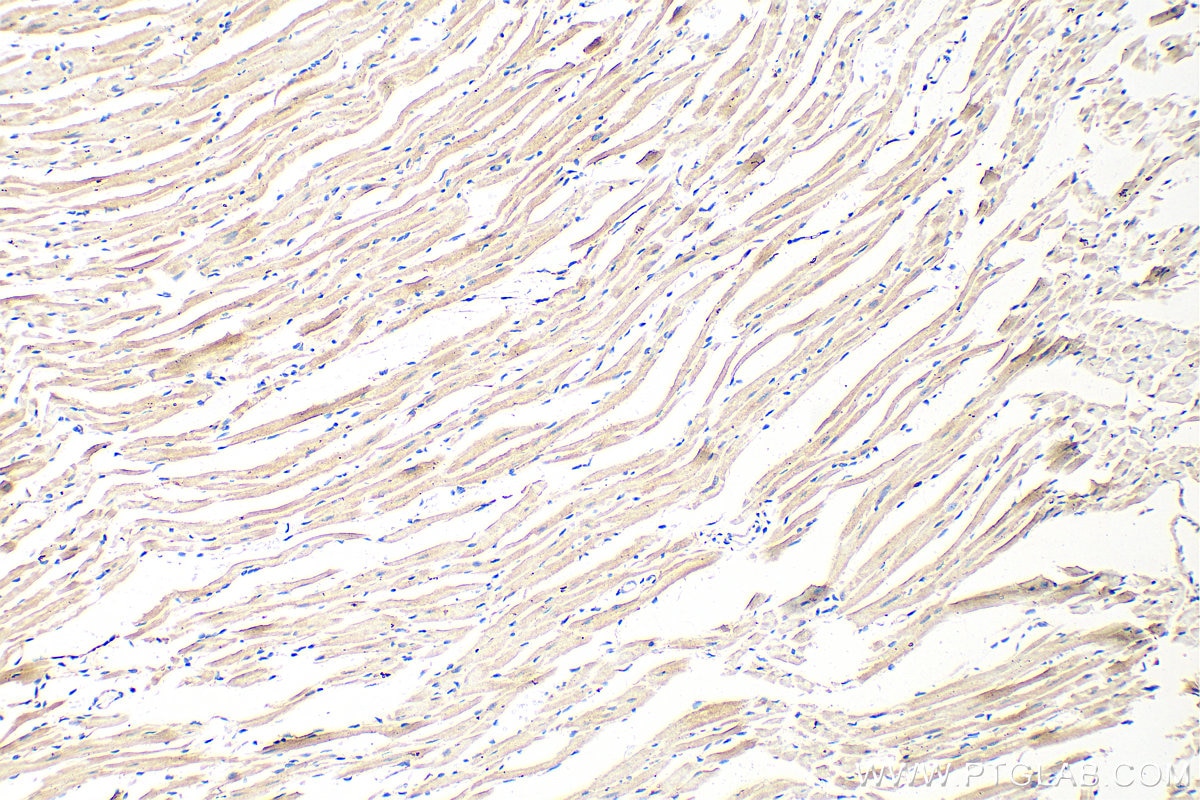Tested Applications
| Positive IHC detected in | mouse heart tissue Note: suggested antigen retrieval with TE buffer pH 9.0; (*) Alternatively, antigen retrieval may be performed with citrate buffer pH 6.0 |
Recommended dilution
| Application | Dilution |
|---|---|
| Immunohistochemistry (IHC) | IHC : 1:50-1:500 |
| It is recommended that this reagent should be titrated in each testing system to obtain optimal results. | |
| Sample-dependent, Check data in validation data gallery. | |
Product Information
16362-1-AP targets TMEM43 in IHC, ELISA applications and shows reactivity with human, mouse, rat samples.
| Tested Reactivity | human, mouse, rat |
| Host / Isotype | Rabbit / IgG |
| Class | Polyclonal |
| Type | Antibody |
| Immunogen |
CatNo: Ag8522 Product name: Recombinant human TMEM43 protein Source: e coli.-derived, PET28a Tag: 6*His Domain: 1-314 aa of BC008054 Sequence: RLVHIIGALRTSKLLSDPNYGVHLPAVKLRRHVEMYQWVETEESREYTEDGQVKKETRYSYNTEWRSEIINSKNFDREIGHKNPSAMAVESFMATAPFVQIGRFFLSSGLIDKVDNFKSLSLSKLEDPHVDIIRRGDFFYHSENPKYPEVGDLRVSFSYAGLSGDDPDLGPAHVVTVIARQRGDQLVPFSTKSGDTLLLLHHGDFSAEEVFHRELRSNSMKTWGLRAAGWMAMFMGLNLMTRILYTLVDWFPVFRDLVNIGLKAFAFCVATSLTLLTVAAGWLFYRPLWALLIAGLALVPILVARTRVPAKKLE Predict reactive species |
| Full Name | transmembrane protein 43 |
| Calculated Molecular Weight | 400 aa, 45 kDa |
| GenBank Accession Number | BC008054 |
| Gene Symbol | TMEM43 |
| Gene ID (NCBI) | 79188 |
| RRID | AB_3085488 |
| Conjugate | Unconjugated |
| Form | Liquid |
| Purification Method | Antigen affinity purification |
| UNIPROT ID | Q9BTV4 |
| Storage Buffer | PBS with 0.02% sodium azide and 50% glycerol, pH 7.3. |
| Storage Conditions | Store at -20°C. Stable for one year after shipment. Aliquoting is unnecessary for -20oC storage. 20ul sizes contain 0.1% BSA. |
Background Information
Transmembrane protein 43 (TMEM43), a member of the TMEM subfamily, is encoded by a highly conserved gene and is widely expressed in most species, ranging from bacteria to humans. The TMEM43 S358L mutation on chromosome 3p25 is an important cause of arrhythmogenic right ventricular cardiomyopathy (ARVC) as it enhances the NF-κB-TGFβ signal cascade, which can lead to aggressive disease at the early stage, and might later develop into heart disease. (PMID: 35260078)
Protocols
| Product Specific Protocols | |
|---|---|
| IHC protocol for TMEM43 antibody 16362-1-AP | Download protocol |
| Standard Protocols | |
|---|---|
| Click here to view our Standard Protocols |




